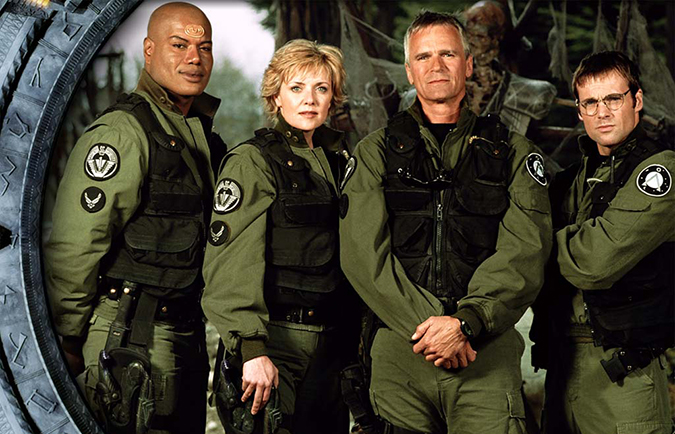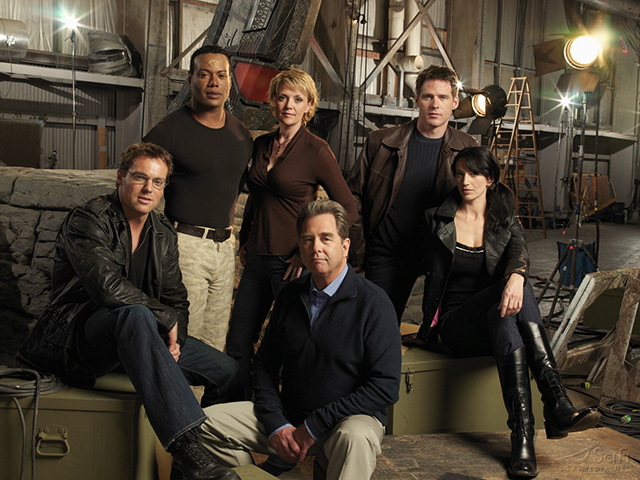Hello again everyone, and welcome to another edition of Channel Chaser! For today’s review, I decided to focus on one of my favorite franchises of all time: the sci-fi spectacular known as Stargate. Spanning seventeen seasons of TV between three different spin-offs from 1997 until 2011, Stargate has become one of the longest-running science fiction shows of all time.
I could go on talking about the intricacies of Stargate for at least three separate columns, and maybe more, but in the interest of saving time and switching up content, I figured I would go ahead and tackle all three series in one review. Together, Stargate SG-1, Stargate Atlantis, and Stargate Universe make up what in my mind is the most highly detailed and fascinating fictional world ever conceived on television. You’d better strap in for this one, because it’s a wild ride.
Stargate first began rather inauspiciously on the silver screen, when its premier movie was released in 1994. In a nutshell, the basic concept of the film was that the Great Pyramids were actually landing platforms for alien spaceships. Said aliens used the ancient Earth myths of the Egyptian gods in order to impersonate the pantheon of deities and rule over the planet, making slaves out of the primitive human population and using a ring-shaped device known as a Stargate to instantaneously transport captives to a planet called Abydos, located on the far side of the galaxy. Thousands of years later in the modern day, a U.S. Air Force team reopens the Stargate, and along with renegade Egyptologist Dr. Daniel Jackson, travels to Abydos to do battle with the aliens and free the long-lost children of Earth from oppression.
While Stargate was considered a commercial success in its time, I personally could never really get behind it. The special effects were cheesy, the plot was pretty lame, and the acting was wooden thanks for B-list stars like James Spader and Kurt Russell. In fact, it’s totally conceivable that the whole idea would have been forgotten if not for MGM’s idea to turn the movie into a series.
Launching in 1997, Stargate: SG-1 picked up where the film left off, reuniting the heroic duo of the nerdy but nice Jackson and the hard-nosed, cynical Colonel Jack O’Neill (with two Ls this time!), along with some new comrades like the brilliant and beautiful Captain Samantha Carter. The show expands on the premise of the movie and rewrites the book on the Stargate, as the team discovers that there is actually a vast network of the devices scattered across the entire galaxy on worlds populated by the ancient peoples of Earth.
Venturing through the ‘Gate on a mission of exploration, O’Neill, Carter, and Jackson are joined by alien freedom fighter Teal’c in a battle against the all-powerful Goa’uld race that lasts all ten seasons of the show’s run. In addition, multiple new baddies are introduced in the form of the insidious mechanical Replicators and the mysterious, god-like Ori, while allies like the frail but advanced Asgard and the Goa’uld splinter group the Tok’ra present themselves. It even turns out that the Stargate wasn’t actually invented by the Goa’uld, as the movie had implied, but is in fact a relic from a much more advanced civilization that died out millions of years before.
Unlike the dark, gory, and gritty blockbuster film that it was spawned from, one thing that really made Stargate: SG-1 stand out from other entries in the sci-fi field like Star Trek, Star Wars and the like was the fact that it never, under any circumstances, took itself seriously. The characters of the show, especially Jack O’Neill, frequently crack jokes at inopportune moments just to point out how ludicrous the situations they get into really are. There’s just some kind of quirky charm about the series that instantly endears it to its audience.
Part of this is SG-1’s incredibly strong casting choices, and the great chemistry between everyone involved in the production. Richard Dean Anderson, starring as O’Neill, deserves special praise in this regard: he’s a smarmy, solid rock of entertainment through his seven-year stint as leader of SG-1, and one additional season as the head of Stargate Command after he gets promoted to General. His bouts of sarcastic wit and total lack of interpersonal skills make him the glue that holds the vastly differing personalities of Carter, Jackson, and Teal’c together and molds them into an effective fighting machine.
However, it is worth noting that every single character, including side ones like base physician Dr. Janet Frasier and the kindly but by-the-book General George Hammond, have several episodes entirely devoted to the development of their character arcs. Some are even so severe that they cause actors to leave the show. Jackson, portrayed by Michael Shanks, dies in the fifth season, only to return in the seventh on the grounds that he merely “ascended” to a higher plane of existence. Anderson’s O’Neill eventually leaves the show as well to make way for sci-fi vets Ben Browder and Claudia Black, of Farscape fame, to move into starring roles as team new guy Colonel Cameron Mitchell and interstellar con artist Valla Mal Doran respectively.
While some people decried the loss of Anderson as cutting out the show’s heart–and I’ll admit that it’s just never quite the same without Jack O’Neill hanging around–Stargate: SG-1 does a good job of integrating the new cast members and keeping the story fresh and interesting right up until the very end.
While the story does stumble and lose its way a bit in the final seasons, getting pretty unnecessarily complex and philosophical, I do think that Browder does about as good a job as anyone could do of filling Anderson’s shoes as the new kid on the block trying to prove he’s cool to the other team members. His more relaxed, friendly, and easy-going character even gets Jackson, Carter, and Teal’c to loosen up a little as well, changing the source of humor from the awkward SG-1 dynamic under O’Neill’s tenure to a more banter-filled, action-driven thrill ride that makes the motley crew much more bad-ass and awesome.
My Rating: 4/5
Even though the special effects aren’t always top-notch and plot holes abound, Stargate: SG-1 is just one of those shows that you can’t help but love, despite its flaws. The actors play off each other in just the right ways to turn this inherently ridiculous outer-space adventure into a compelling human story about the relationships between totally different kinds of people, and how they can change each other for the better. Plus, it’s just loads of fun to watch. The universe the show creates is just…well…out of this world.
Join me again in two weeks when I tackle Part 2 of my Stargate franchise review with SG-1’s two companion shows, Atlantis and Universe, and see how they stack up to the good old original!
Channel Chaser is written by Kyle Robertson. You can check out more of his work on his website. Check back every Friday for new articles.

